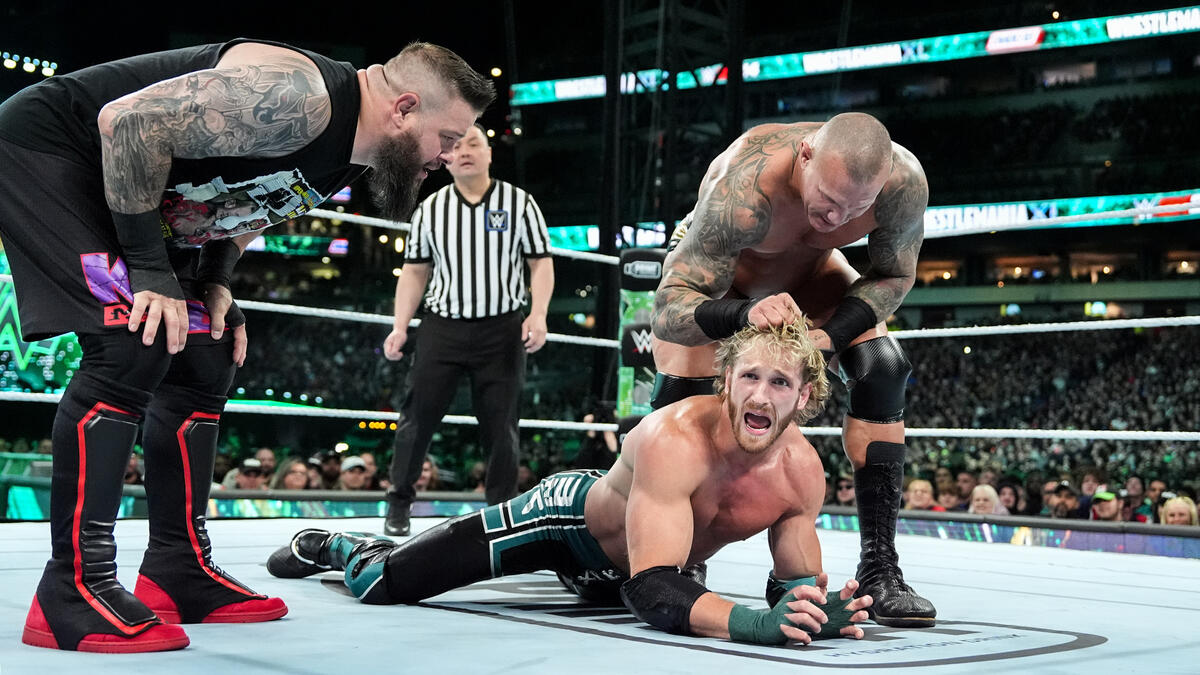
Logan Paul defeated Randy Orton and Kevin Owens to retain the WWE United States Championship at WrestleMania 40 (Night Two).
During a recent appearance on “The Pat McAfee Show,” Paul stated that fighting Owens was more challenging than boxing Floyd Mayweather.
The Maverick said, “I can’t believe I’m about to say this…fighting Kevin Owens was harder than fighting Floyd Mayweather. Let me tell you something; wrestling is the hardest thing I have ever done in my life. There is no industry that requires the amount of skillsets all in one like the WWE. It is crazy. You know the amount of things you have to think about when you’re in that ring. I liken it, and I’ve said it a thousand times, but when you’re boxing, I’m worried about one person. I’m worried about the guy across from me. When I’m wrestling, I’m worried about 60K people in the arena. And it’s my job to make sure they got their money’s worth. I take that very, very seriously. I’m in the lab man. I want to make sure you guys got your money’s worth on Sunday.”
Paul and Mayweather engaged in a boxing exhibition match in 2021, resulting in a tie.
Logan Paul, the YouTube star turned professional boxer, recently made headlines in the wrestling world by defeating Randy Orton and Kevin Owens to retain the WWE United States Championship at WrestleMania 40 (Night Two). However, what surprised many was Paul’s statement on “The Pat McAfee Show” where he claimed that fighting Owens was more challenging than his boxing match against Floyd Mayweather.
In the interview, Paul expressed his astonishment by saying, “I can’t believe I’m about to say this…fighting Kevin Owens was harder than fighting Floyd Mayweather.” He went on to explain why wrestling is such a demanding and complex industry, stating that it requires a wide range of skillsets all in one.
According to Paul, the WWE is an industry that demands a high level of skill and versatility. He emphasized that there is no other industry that requires the same amount of physicality, athleticism, acting, and crowd engagement as professional wrestling. Paul described the experience of being in the ring and having to think about not only his opponent but also the thousands of fans in attendance. He acknowledged the responsibility of ensuring that the audience gets their money’s worth and takes that duty very seriously.
Comparing it to his boxing career, Paul highlighted the difference in focus. In boxing, he is primarily concerned with his opponent across the ring. However, in wrestling, he has to consider the expectations and reactions of the crowd. This added pressure makes wrestling a more challenging endeavor for him.
It is worth noting that Logan Paul’s statement should be taken with a grain of salt, considering his background as a controversial internet personality. Nevertheless, his acknowledgment of the difficulty and complexity of professional wrestling sheds light on the physical and mental demands that wrestlers face.
Paul’s comments also highlight the ongoing debate about whether professional wrestling should be considered a legitimate sport or purely entertainment. While some may argue that wrestling is scripted and predetermined, it cannot be denied that the physical toll and the level of athleticism required by wrestlers are very real.
Logan Paul’s victory at WrestleMania 40 and his statement about the challenges of wrestling have sparked discussions among fans and critics alike. Regardless of one’s opinion on Paul’s involvement in the wrestling world, his comments serve as a reminder of the dedication and skill required to succeed in the WWE and the broader professional wrestling industry.
In conclusion, Logan Paul’s recent triumph in retaining the WWE United States Championship at WrestleMania 40 and his statement about the difficulty of wrestling compared to boxing Floyd Mayweather have generated significant buzz. While opinions may vary on Paul’s credibility, his remarks shed light on the multifaceted nature of professional wrestling and the physical and mental demands placed on its performers.
